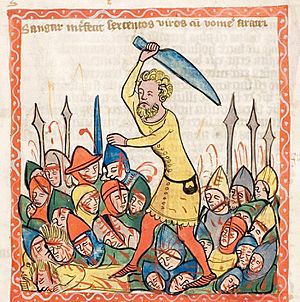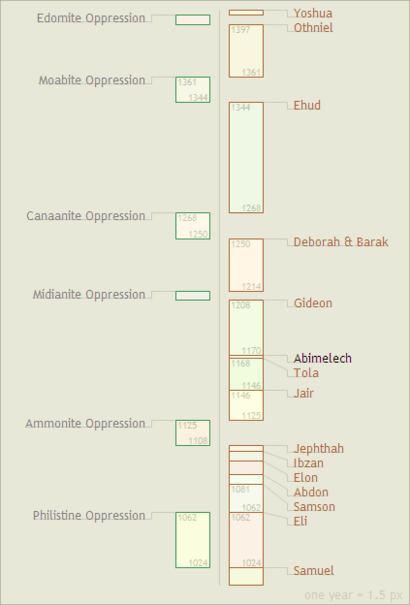Biblical judges facts for kids
The biblical judges are described in the Hebrew Bible, and mostly in the Book of Judges, as people who served roles as military leaders in times of crisis, in the period before an Israelite monarchy was established.
Role
A cyclical pattern is regularly recounted in the Book of Judges to show the need for the various judges: apostasy of the Israelite people, hardship brought on as punishment from God, crying out to the Lord for rescue.
The story of the judges seems to describe successive individuals, each from a different tribe of Israel, described as chosen by God to rescue the people from their enemies and establish justice.
While judge is a literalistic translation of the Hebrew term used in the Masoretic text, the position as described is more one of unelected non-hereditary leadership than that of legal pronouncement. However, Cyrus H. Gordon argued that they may have come from among the hereditary leaders of the fighting, landed and ruling aristocracy, like the kings (basileis) in Homer. Coogan says that they were most likely tribal or local leaders, contrary to the Deuteronomistic historian's portrayal of them as leaders of all of Israel, but Malamat pointed out that in the text, their authority is described as being recognized by local groups or tribes beyond their own.
Historicity and timeline
The biblical scholar Kenneth Kitchen argues that, from the conquest of Canaan by Joshua until the formation of the first Kingdom of Israel and Judah (c. 1150–1025 BCE), the Israelite tribes may have formed a loose confederation. In this conception, no central government would have existed but in times of crisis, the people would have been led by ad hoc chieftains, known as judges (shoftim). However, some scholars are uncertain whether such a role existed in ancient Israel.
Working with the chronology in Judges, Payne points out that although the timescale of Judges is indicated by Jephthah's statement (Judges 11:26) that Israel had occupied the land for around 300 years, some of the judges overlapped one another. Claiming that Deborah's victory has been confirmed as taking place in 1216 from archaeology undertaken at Hazor, he suggests that the period may have lasted from c. 1382 to c. 1063.
Bill T. Arnold and H. G. M. Williamson wrote that if
all the figures given in Judges (years of oppression, years the judges led Israel, years of peace achieved by the judges) are treated as consecutive, then the total duration of the events described in Judges is 410 years. If we accept a date of 1000 BCE for the beginning of David's reign over all Israel, which puts the beginning of Eli's leadership of Israel at about 1100 BCE, then the judges period would begin no later than 1510 BCE – impossible even for those who date the conquest to the fifteenth century BCE
There is also doubt among some scholars about any historicity of the Book of Judges.
Judges mentioned in the Hebrew Bible
In the Hebrew Bible, Moses is described as a shofet over the Israelites and appoints others to whom cases were delegated in accordance with the advice of Jethro, his Midianite father-in-law. The Book of Judges mentions twelve leaders who are said to "judge" Israel: Othniel, Ehud, Shamgar, Deborah, Gideon, Tola, Jair, Jephthah, Ibzan, Elon, Abdon, and Samson. Ehud, described in the text between Othniel and Shamgar, is usually included as a judge because the history of his leadership follows a set pattern characteristic of five of the others. The First Book of Samuel mentions Eli and Samuel, as well as Joel and Abiah (two sons of Samuel). The First Book of Chronicles mentions Kenaniah and his sons. The Second Book of Chronicles mentions Amariah and Zebadiah (son of Ishmael).
The Book of Judges also recounts the story of Abimelech, an illegitimate son of Gideon, who was appointed as a judge-like leader by the citizens of the city of Shechem. He was later overthrown during a local conflict, and the classification of Abimelech as a judge is questionable.
The biblical text does not generally describe these leaders as "a judge", but says that they "judged Israel", using the verb שָׁפַט (š-f-t). Thus, Othniel "judged Israel" (Judges 3:10), Tola "judged Israel twenty-three years" (Judges 10:2), and Jair judged Israel twenty-two years (Judges 10:3).
See also
 In Spanish: Juez bíblico para niños
In Spanish: Juez bíblico para niños



